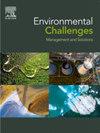Small-scale fisherfolk in Papua New Guinea: Perspectives on climate variability and its impact on coastal fishing operations and activities
Q2 Environmental Science
引用次数: 0
Abstract
This study aimed at exploring climate variability and small-scale fishers’ perspectives on how climate variability impacts fishing operations in East New Britain (ENB) province in Papua New Guinea. Climate data from 2000 to 2020 and participatory interactions with 80 fishers in three fishing villages of ENB were utilized and conducted. Findings revealed that traditionally, small-scale fisheries (SSF) of ENB have sustained the livelihoods of coastal and island communities for millennia. However, the projected impacts of climate change (CC) are posing significant challenges to fishers, yet limited research has explored the plight of SSF, and fishers, including their knowledge of CC variability. Coastal livelihoods and activities are dependent on fishing and fishing knowledge that is cross-generational. Women and renowned fishers (with unique fish harvesting skills) are critical actors, e.g., in identifying historically rich fishing grounds, and helping fishers or local communities in fishing activities and community festivals, e.g., conventional marriages. Fishing is a sociocultural identity, and this has led to emphasis on sustainable fishing practices by fishers and some key stakeholders, e.g., on the utilization of eco-friendly gear, wooden fences, marking of fish migratory routes, and stone traps. However, the fishers population is ageing. During peak fishing seasons that last one week per month, and depending on the fishing method, fishers earn between 300 and 1500 Kina (72–359 USD) daily. Increasing socioecological shifts were reported, including reducing fish economic value, changing fishing locations, and declining catch. Since 2000, sea surface temperatures (SSTs) have increased by about 1 °C and in December 2020, SST reached 30.20 °C, with the northern and eastern coastal zones of PNG being greatly affected. Fishers reported four critical concerns that affect their livelihoods and which could increase their vulnerability to human-environmental risks. 65 % of fishers are uncertain or have limited knowledge on CC, climate variability, its drivers, and associated impacts. Fishers emphasized fourteen perspectives that could mitigate the increasing socioecological shocks and vulnerabilities they face. Most of the perspectives cut across socio-cultural, economic, institutional, and environmental domains of sustainable fishing practices. Five starting points for sustainability transformations for policy and research are recommended including: (1) education programs on ecological processes, fishers’ local socioecological knowledge and climate variability, (2) collaborative stakeholder engagements in CC-policy design and community adaptation and mitigation actions, (3) integrated socio-ecological approaches on marine resource management, cost-benefit sharing, and co-management, (4) capacity-building programs and initiatives, and (5) proactive national-level prioritization of coastal and island fishers’ rights. Although fishers in ENB are reportedly uncertain about CC knowledge, and yet there is evidence of pronounced climate variability, ocean environmental parameters, threatened fisheries and livelihood vulnerabilities, collaborative and effective fisheries management approaches might mitigate it. This can be via proactive integration of CC adaptation, sustainable fisheries management, better governance within the existing institutional structures, and support for community-led resilience strategies.
巴布亚新几内亚的小规模渔民:气候变率及其对沿海渔业作业和活动影响的观点
本研究旨在探讨气候变化和小规模渔民对气候变化如何影响巴布亚新几内亚东新不列颠(ENB)省渔业活动的看法。利用2000 - 2020年的气候数据,并与ENB三个渔村的80名渔民进行了参与式互动。调查结果显示,传统上,ENB的小规模渔业(SSF)维持了沿海和岛屿社区数千年的生计。然而,预计的气候变化(CC)影响对渔民构成了重大挑战,但有限的研究探索了SSF和渔民的困境,包括他们对CC变异性的认识。沿海地区的生计和活动依赖于渔业和跨代的渔业知识。妇女和著名渔民(具有独特的捕鱼技能)是关键的行动者,例如,在确定历史上丰富的渔场,并帮助渔民或当地社区进行捕鱼活动和社区节日,例如传统婚姻。捕鱼是一种社会文化认同,这导致渔民和一些关键利益相关者强调可持续的捕鱼做法,例如,利用生态友好的渔具、木制围栏、标记鱼类洄游路线和石头陷阱。然而,渔民人口正在老龄化。在每月持续一周的捕鱼旺季,根据捕鱼方法的不同,渔民每天的收入在300到1500基那(72-359美元)之间。据报道,越来越多的社会生态变化,包括鱼类经济价值降低、捕捞地点改变和捕捞量下降。2000年以来,海温升高约1°C, 2020年12月海温达到30.20°C,巴布亚新几内亚北部和东部沿海地区受到较大影响。渔民报告了影响他们生计的四个关键问题,这些问题可能会增加他们对人类环境风险的脆弱性。65%的渔民对碳流变、气候变率、其驱动因素和相关影响的知识不确定或有限。fisher强调了14种可以减轻他们所面临的日益增加的社会生态冲击和脆弱性的观点。大多数观点跨越了可持续捕鱼做法的社会文化、经济、体制和环境领域。为政策和研究的可持续性转变提出了五个起点,包括:(1)关于生态过程、渔民当地社会生态知识和气候变率的教育方案;(2)利益相关者在共同承诺政策设计和社区适应和减缓行动中的协作参与;(3)关于海洋资源管理、成本效益分享和共同管理的综合社会生态方法;(4)能力建设方案和倡议;(5)沿海和岛屿渔民权利在国家层面的积极优先次序。据报道,虽然ENB的渔民对CC知识不确定,但有证据表明气候变率明显,海洋环境参数,受威胁的渔业和生计脆弱性,协作和有效的渔业管理方法可能会缓解这种情况。这可以通过积极整合气候变化适应、可持续渔业管理、现有体制结构内更好的治理以及支持社区主导的复原力战略来实现。
本文章由计算机程序翻译,如有差异,请以英文原文为准。
求助全文
约1分钟内获得全文
求助全文
来源期刊

Environmental Challenges
Environmental Science-Environmental Engineering
CiteScore
8.00
自引率
0.00%
发文量
249
审稿时长
8 weeks
 求助内容:
求助内容: 应助结果提醒方式:
应助结果提醒方式:


